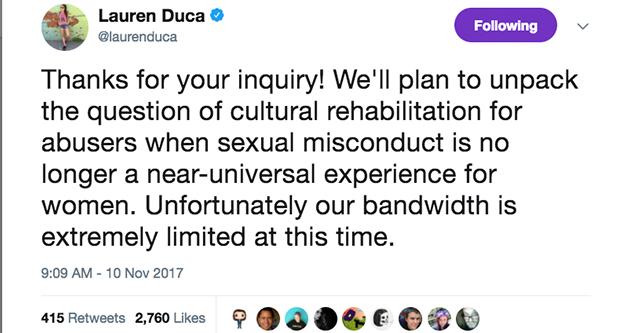Ever since Harvey Weinstein’s sexual misconduct accusations, alleged sexual abusers are being outed left and right. Little is being left behind in the wake of empowered survivors of sexual assault finally feeling able to admit the trespasses of their harassers.
Every day, more and more people affected by sexual assault are coming forward with their experiences and, in their solidarity, are finding an audience of listeners ready and willing to validate their plights.
While this age of empowered survivors coming forward is more important than ever, it feels crucial to acknowledge the history of people revealing perpetrators of sexual assault, including the experiences of women like Anita Hill, who disclosed her experience with sexual assault in the 1990s.
Men didn’t start abusing their power and privilege in 2017 — sexual assault, abuse and misconduct have been alive and well for far longer.
Because of the patriarchal society that we live in, societal norms enable powerful men to use their power to take advantage of men and women alike.
By placing the majority, if not all, of societal power on men, we are teaching women from a young age that their experiences are lesser and that their existence revolves around pleasing and accommodating men.
From elementary ages, patriarchal societal norms condition girls to see themselves and be seen by others as sexual objects. More often than not, young girls are victims of body policing rooted in things like school dress codes.
Dress codes have given a structured platform for our patriarchal society to exercise ownership over the bodies of young girls. It tells them that if boys can see their shoulders or bra straps, they will be distracted and it’s not the fault of young boys, but instead the girls that choose to wear spaghetti straps or shorts that go above their knees.
By suggesting that from the age of 5, the appearance of young girls can be a distraction for boys sexualizes girls on the most basic level. By saying that a pair of shorts can’t go above a 7-year-old’s knees, the society we live in internalizes seeing young girls as sexual objects capable of distracting boys with their physical appearance.
If you are surprised that so many people, from Hollywood and beyond, are coming out against sexual abusers, don’t be. Sexual assault and misconduct have always existed. The only difference is that now society is less likely to enable abusers despite their power. Survivors of sexual assault and abuse are finding solace and empowerment in each other’s experience and know that there is power in numbers.
Judging from the droves of men and women alike speaking out against sexual abuse and assault, this long-standing problem has no immediate solution.
So what do we do? How do we end the silencing of survivors of sexual misconduct and assault?
As long as we enable powerful men to pay women off and silence accusers with threats of slander or physical violence, sexual violence will always be a problem.
The solution instead can come from a readjustment of attitudes and the way we view those who have experienced sexual assault and by dismantling misogynistic mindsets toward them.
Undoing our patriarchal society we live in by holding men accountable is not easy, but is happening with every brave survivor telling his or her experience.
Unfortunately, not everyone has that privilege and it’s important to recognize that. Survivors of sexual abuse, assault and misconduct everywhere remain muzzled, afraid to lose their jobs or risk their credibility being questioned.
This is why the droves of people speaking out against celebrities like Kevin Spacey or Harvey Weinstein are so important. There is power in numbers.
But to continue encouraging people to speak out against the powerful who perpetrate sexual abuse, we must stop gaslighting survivors.
We must believe them. We have to stop enabling a society that treats those who have experienced sexual assault as people who should be paid off or afraid to come forward.




